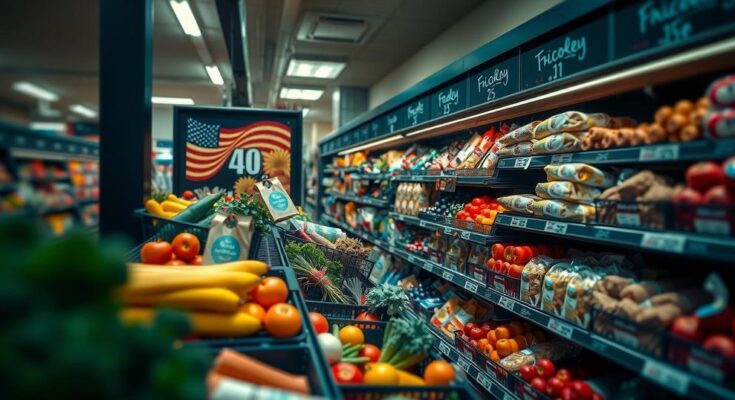The article discusses the significant impact of rising grocery prices on recent political elections in the US and globally, noting that inflation, exacerbated by climate change, has created widespread voter dissatisfaction. It critiques traditional economic models and highlights the inequities faced by lower-income households. The author proposes three strategic steps to address the crisis: implementing wealth taxes, reconsidering inflation management strategies, and localizing production for essential goods.
In the recent United States elections, soaring grocery prices played a pivotal role in the Republican party’s success, with about 75% of voters from the party reporting significant hardship due to rising costs. This trend is not confined to the U.S.; globally, inflation has severely impacted political landscapes, leading to notable election defeats for incumbents in major economies such as India and Japan. Price increases for staples like rice and food inflation are pressing concerns for voters, revealing a widespread sentiment of discontent with government handling of inflationary pressures. The cascading effects of climate change exacerbate these inflationary trends, leading to dramatic spikes in food prices. For instance, staple items such as olive oil and butter have seen significant increases due to extreme weather events affecting harvests. In the U.S., essential foods have spiked in price, influencing a public perception starkly at odds with optimistic economic indicators presented by official sources. This disconnect highlights how government measures often overlook the reality experienced by average households. Conventional economic models fail to account for the deep-seated impact of inflation on consumer experiences, particularly for low-income households. As inflation rises, interest rate hikes may further isolate those struggling with rising essentials. The resulting economic landscape has seen profitable outcomes for major agribusinesses, raising concerns over inequities amidst widespread hardship. To address these challenges, three strategic steps are recommended: implementing wealth taxes to redistribute profits gained from inflation, reconsidering conventional approaches to curb inflation through interest rates, and ultimately revitalizing supply systems for essential goods to enhance resilience against climate shocks. This approach emphasizes local production, supporting communities and sustainable practices that prioritize essential needs over unfair profit margins.
The article highlights the current political and economic ramifications of rising prices for essentials, particularly food. It explores how inflation is reshaping voter sentiment and political parties’ fortunes in several of the world’s largest economies, linking these economic pressures with broader issues of climate change. The discussion situates inflation not just as a temporary shift but as part of a systemic issue exacerbated by climate-related events, resulting in significant changes in supply chain dynamics and consumer behavior. It delves into key statistics from elections in India and Japan, emphasizing the growing anger and frustration among voters regarding inflation and government responses. The author contextualizes these views within a broader global economic framework, noting the disproportionate effects of inflation on lower-income households.
The interplay between soaring food prices and political outcomes indicates a growing disconnect between official economic measures and the lived experiences of citizens. As inflation threatens the stability of households globally, it is crucial to reassess traditional economic strategies and implement reforms that prioritize essential goods and support vulnerable communities. Embracing a new economic paradigm that acknowledges the realities of climate change will be essential for fostering resilience and equity in a changing world.
Original Source: www.theguardian.com




